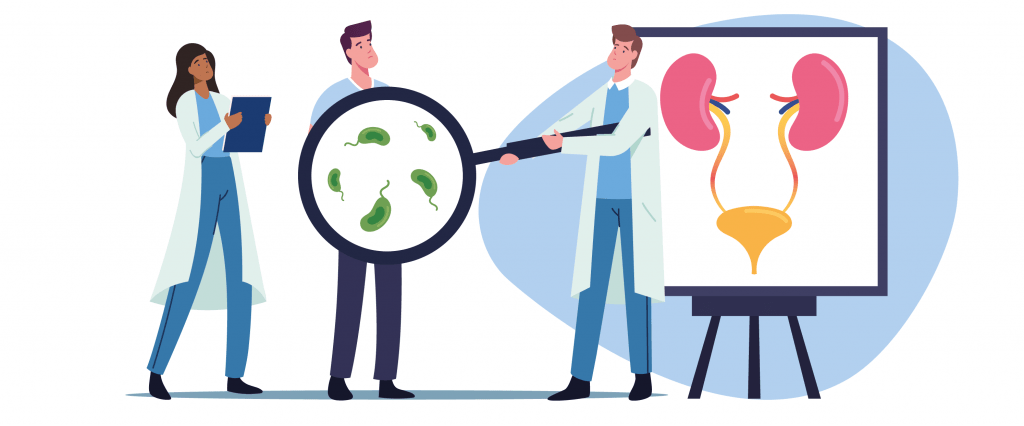What is a urinary tract infection (UTI) and how do I manage it?
UTIs, or urinary tract infections, are fairly common, particularly in women, with around 50-60% of women experiencing one within their lifetime1. They can also occur in children and men. However common they may be, many wonder ‘What is a urinary tract infection?’. A UTI infection is a microbial infection that affects the urinary tract, which includes the bladder (cystitis), urethra (urethritis) and kidneys (kidney infection).2
Symptoms of a UTI infection
There are two forms of UTI: lower tract UTIs (affecting the urethra and bladder) and upper tract UTIs (affecting the kidneys). Symptoms of lower tract UTIs include:
- a burning sensation when weeing
- an increased frequency of urination
- an increased urgency of urination
- bloody or cloudy urine
- wee with a strong odour
- pelvic pain in women
- rectal pain in men3
- lower abdominal pain
- a high temperature or feeling hot and shivery
- a very low temperature
- confusion and agitation in older people
- incontinence in older people4

Upper tract UTIs can be more serious, so if you have any of the following symptoms, please contact your doctor:
- pain and tenderness in the lower back
- chills
- fever
- nausea
- vomitting5
In children, UTIs can present different symptoms, so look out for:
- a high temperature
- appearing generally unwell
- wetting the bed or themselves
- vomitting6

Causes of UTIs
Urinary tract infections are caused by bacteria entering the urinary tract through the urethra and multiplying in the bladder.7 This is predominantly due to bacteria from the gastrointestinal tract entering the urinary tract.8 As women have shorter urethras than men, it is easier for bacteria to enter9, though UTIs can occur in people of all genders and ages. Some causes of UTIs are:
- intercourse
- pregnancy
- kidney stones
- an enlarged prostate in men and constipation in children
- urinary catheters
- a weekend immune system (e.g. people with diabetes or undergoing chemotherapy)
- not keeping hydrated
- improper personal hygiene10
While most people only experience UTIs occasionally, some may suffer from recurrent urinary tract infections or chronic bladder infection. If you’ve had more than two UTIs in a six-month period11, please speak to a healthcare provider for advice.
To learn more about preventing UTIs, please read our blogpost on avoiding urinary tract infections in winter.

Managing UTIs
UTIs are usually treatable at home, though if you have any concerns, it’s recommended to speak to a healthcare professional. Some general management tips are:
- take plenty of rest
- drink lots of fluids to keep the urine light
- avoid intercourse until you feel better12
- manage leaks using absorbent pads or pants
- take paracetamol to treat pain and fever
If you or your loved one need help to treat a urinary tract infection, consider using our iD range of continence products. Our products are flexible, discreet and anatomically shaped to offer you the best protection. Shop our range of pads, pants and bed protection for men, women and children here.

1 “Recurrent Urinary Tract Infections in Women Management”, Ahmed Al-Badr and Ghadeer al-Sheikh, 25 June 2013, Source: https://www.ncbi.nlm.nih.gov/pmc/articles/PMC3749018/
2 “Urinary Tract Infections (UTIs), NHS, 18 November 2020, Source: https://www.nhs.uk/conditions/urinary-tract-infections-utis/
3 “Everything You Need to Know about Urinary Tract Infection”, Verneda Lights, 29 July 2020, Source: https://www.healthline.com/health/urinary-tract-infection-adults
4 “Urinary Tract Infections (UTIs), NHS, 18 November 2020, Source: https://www.nhs.uk/conditions/urinary-tract-infections-utis/
5 Ibid
6 “Urinary Tract Infections (UTIs), NHS, 18 November 2020, Source: https://www.nhs.uk/conditions/urinary-tract-infections-utis/
7 “Urinary tract infection (UTI)”, Mayo Clinic, n.d., Source: https://www.mayoclinic.org/diseases-conditions/urinary-tract-infection/symptoms-causes/syc-20353447
8 “Urinary-tract infections”, NICE, n.d., Source: https://bnf.nice.org.uk/treatment-summary/urinary-tract-infections.html
9 “Urinary Tract Infections (UTIs), NHS, 18 November 2020, Source: https://www.nhs.uk/conditions/urinary-tract-infections-utis/
10 Ibid
11 “Chronic bladder infection: Is there a cure?”, Mayo Clinic, n.d., Source: https://www.mayoclinic.org/diseases-conditions/cystitis/expert-answers/bladder-infection/faq-20057833
12 “Urinary Tract Infections (UTIs), NHS, 18 November 2020, Source: https://www.nhs.uk/conditions/urinary-tract-infections-utis/
